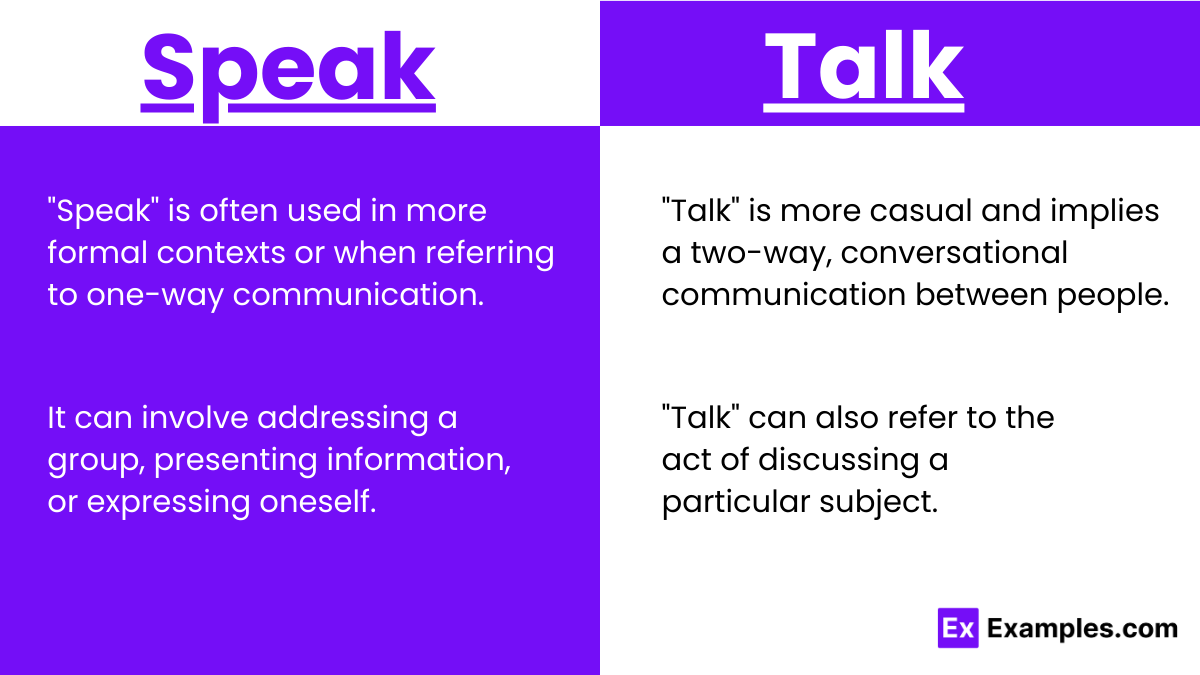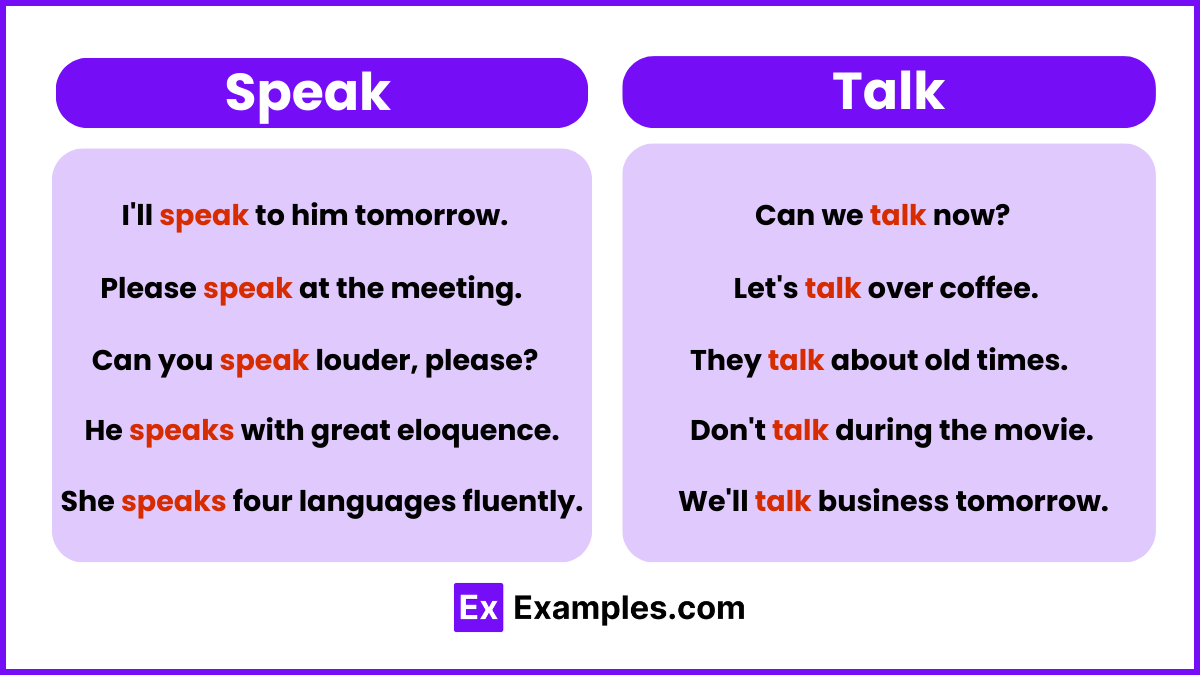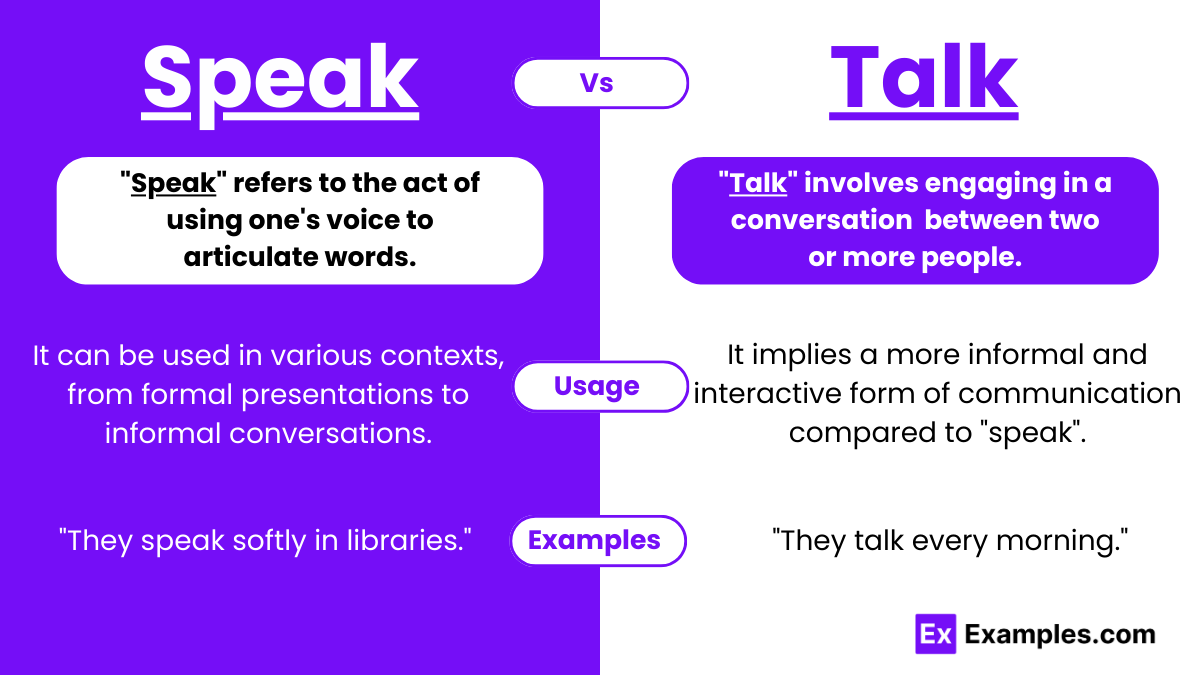Speak vs Talk – Meanings, Difference, Examples, Usage
The verbs ‘speak‘ and ‘talk‘ are often used interchangeably, leading to common misunderstandings in their usage. ‘Speak‘ often implies a more formal or one-way communication, while ‘talk‘ suggests an informal, interactive exchange. This guide aims to clarify the subtle distinctions between these two words, enhancing your communication skills and helping you choose the right verb for every situation.
Speak and Talk – Meanings
- Speak: The verb “speak” refers to the act of using one’s voice to articulate words. It can be used in various contexts, from formal presentations to informal conversations. “Speak” often conveys a sense of one-way communication or a formal tone.
- Talk: “Talk“, as a verb, involves engaging in a conversation or discussion where there is an exchange of ideas between two or more people. It implies a more informal and interactive form of communication compared to “speak“.
Summary
To “speak” is to articulate words in a formal or one-way communication setting, like giving a speech. “Talk“, in contrast, implies a two-way, more informal exchange of thoughts and ideas, as in having a chat. Remembering the context can help you choose between “speak” and “talk”.
How to Pronounce Speak and Talk
- Speak: Pronounced as /spiːk/ (speak).
- Talk: Pronounced as /tɔːk/ (talk).
The difference in pronunciation lies in the vowel sounds and the ending consonant, helping to distinguish their uses in speech.
Differences between Speak and Talk
| Aspect | Speak | Talk |
|---|---|---|
| Grammatical Role | Active Verb | Active Verb |
| Formality | More formal | More informal |
| Communication Type | Often one-way | Interactive, two-way |
| Context | Formal settings, presentations | Casual conversations, discussions |
| Nuance | Focus on the act of producing words | Emphasis on the exchange of ideas |
How to Remember the Difference between Speak and Talk
To differentiate “speak” from “talk“, think of “speak” as a more formal act, often one-sided, like delivering a speech. “Talk” suggests a back-and-forth, like chatting with friends. The “lk” in “talk” can remind you of “look back”, indicating a two-way interaction.
When to Use Speak and Talk

Usage of Speak
- Formality and Authority: “Speak” is often used in more formal contexts or when referring to one-way communication. It implies a level of authority or emphasis.
- Example: The professor will speak about ancient history today.
- Language Proficiency: When discussing the ability to use a language.
- Example: She can speak four languages fluently.
- Public Speaking: Used when referring to giving speeches or formal presentations.
- Example: She was invited to speak at the conference.
- Requesting Attention: To ask for the chance to talk in a conversation or a formal setting.
- Example: May I speak now?
Usage of Talk
- Informality and Casual: “Talk” is more casual and implies a two-way, conversational communication between people.
- Example: Let’s talk about your weekend plans.
- Discussion: When referring to an exchange of ideas, opinions, or casual conversation.
- Example: We need to talk about the new project proposal.
- Gossip or Small Talk: In contexts where the conversation might not be of high importance.
- Example: They were just talking about the weather.
- Personal and Emotional: Often used when discussing personal matters or emotions.
- Example: We should talk about how you’re feeling after the incident.
How to use Speak and Talk
Speak
- Use of Speak as a Verb: When “speak” is used as a verb, it focuses on the act of articulating words, often in a formal or structured setting. It can involve addressing a group, presenting information, or expressing oneself in a situation that requires a certain level of formality or clarity.
Talk
- Use of Talk as a Verb: “Talk” as a verb emphasizes the interactive nature of communication. It involves an exchange of ideas or information in a more informal, relaxed setting. “Talk” can also refer to the act of discussing a particular subject or issue in a conversational manner.
Speak and Talk – Examples

Examples of Speak
- Firstly, ensure clarity and volume when you speak at events.
- Moreover, confidence boosts the impact of your speak.
- On the other hand, speaking too fast can lose audience interest.
- Additionally, immerse in the culture of speak for natural fluency in a foreign language.
- Finally, speak kindly, as words can heal or hurt.
Examples of Talk
- Firstly, let’s talk project goals for clarity.
- Besides, address team issues through open talk.
- Conversely, focus on solutions, not just problem talk.
- Furthermore, active listening is key in client talks.
- In conclusion, casual talks often strengthen bonds.
Synonyms
| Speak | Talk |
|---|---|
| Utter | Chat |
| Articulate | Converse |
| Pronounce | Discuss |
Exercise
Fill in the blanks with either “speak” or “talk” to complete the sentences accurately.
- Can we ________ about your plans for the summer?
- He will ________ at the conference next month.
- I need to ________ to you in private.
- They love to ________ about old times.
- She can ________ four languages.
Answers
- talk
- speak
- talk
- talk
- speak
FAQ’S
Can I Talk or Can I Speak To?
“Can I speak to?” is formal, used in professional settings. Rather “Can I talk to?” is casual, for informal conversations.
What is the Difference Between Speak and Speak In?
“Speak” means to utter words. “Speak in” specifies using a particular language or style.
What is the Difference Between Speak, Spoke, and Spoken?
“Speak” is present tense, “spoke” is past tense, and “spoken” is the past participle, often with “have” or “has”.
What is the Difference Between Speak, Talk, Tell, and Say?
“Speak” and “talk” involve conversation; “tell” means to give information; “say” is to utter words or phrases.
Is it I’ve Just Spoken or I Just Spoke?
Both are correct. “I’ve just spoken” is present perfect; “I just spoke” is simple past, with slight nuance in use.


